Newsletter from the Pacific Economic Cooperation Council (PECC)
PAST EVENT
21st PECC General Meeting (PECC XXI) | Vancouver, Canada | June 3-5, 2013
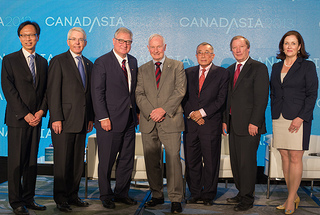 The 21st General Meeting of PECC (PECC XXI), hosted by CANCPEC (Canada committee for PECC)/ Asia Pacific Foundation of Canada, took place in Vancouver on June 3-5, 2013, in conjunction with Canada-Asia 2013. The 21st General Meeting of PECC (PECC XXI), hosted by CANCPEC (Canada committee for PECC)/ Asia Pacific Foundation of Canada, took place in Vancouver on June 3-5, 2013, in conjunction with Canada-Asia 2013.
The opening plenary session, 'Key Trends Shaping the Asia-Pacific" examined the latest economic, political, and social trends in the Asia-Pacific, identifying the emerging opportunities and uncertainties in the region. The plenary session was followed by concurrent breakout sessions which covered diverse topics including: infrastructure deficit in the Asia-Pacific, creativity and innovation in Asia, promoting inclusive growth and resilient societies in Asia, green growth, and risks to growth in the Asia-Pacific. Next day plenary sessions addressed Canada's Asia strategy and how economies are responding to the rise of Asia. Thereafter, breakout sessions focused on Canada's contribution to sustainable growth in the Asia-Pacific, and preparation of Canada's next generation to compete in an international environment increasingly influenced by developments in Asia.
The Pacific Economic Cooperation Council issued its 'Vancouver Statement' at the conclusion of the 21st General Meeting of PECC held in Vancouver during June 4-5, 2013. The Council’s Standing Committee has been reviewing the changes in the geopolitical and economic landscape noting the larger variety of regional cooperation processes and the implications this had for Track 2 engagement.
The Statement reaffirms PECC’s commitment to open regionalism in the Asia-Pacific. The Council’s members highlighted the role that open regionalism has played in the rapid growth of the region and the continued role that it should play in further strengthening the integration of the region. The Statement highlights the need for APEC economies and our leaders to reaffirm their commitment to open regionalism, regional integration, and structural reforms as means to increase efficiency and growth. As PECC has urged in the past, such growth should be balanced, inclusive, and sustainable.
PECC General Meetings are open to the wider public and attended also by youth delegates who have been selected by their respective PECC member committees. Thirty graduate and post-graduate students from across the Asia-Pacific and Canada participated in the 21st PECC General Meeting.
For more information about the event and program agenda, please visit: canadaasia2013.ca.

Program agenda
Related press releases
Related news clippings
UPCOMING EVENT
Energy Transition Seminar 1: Commercial Development of New Energies and Industrial Use of Oceans | Papeete, French Polynesia | October 15-16, 2013
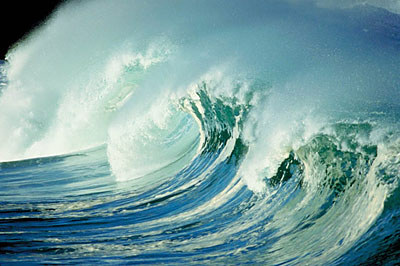 Energy is at the top of the list of priorities for all PECC economies. We need to invest more in developing and optimizing new types of energy. We need to explore the most efficient ways of ensuring smooth transitions from fossil fuels to non-traditional or renewable energies that offer more sustainable solutions to meet the growing energy demands. Energy is at the top of the list of priorities for all PECC economies. We need to invest more in developing and optimizing new types of energy. We need to explore the most efficient ways of ensuring smooth transitions from fossil fuels to non-traditional or renewable energies that offer more sustainable solutions to meet the growing energy demands.
Divided into a series of three seminars, the project will examine energy transition in three main aspects: 1) commercial development and market viability of new energies, 2) technologies involved in energy transition and their applicability, and 3) public energy policies.
The first seminar will aim to:
- open discussions and make recommendations in favor of commercial development of marine energies;
- identify different possibilities that marine energies could offer in meeting the two important challenges regarding renewable energy: a) predictability, and b) storage or linkage to the existing power grids; and
- encourage discussions on the need to bring new types of energies to market competitiveness by focusing on: a) advancing the technical knowledge from the drawing board to the market, and b) enhancing the capability of industrial enterprises to reform their business models with the aims to facilitate energy transition in the PECC economies.
If you are interested in taking part in the seminar or wish to find out more, please contact: info@pecc.org.
More...
MEMBER UPDATES
MANCPEC: Passing of Dato Dr. Mahani Zainal Abidin
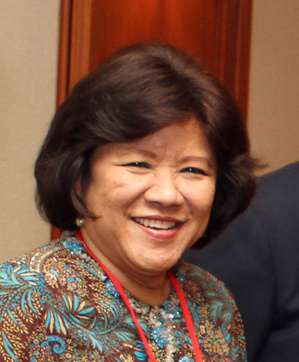 Dato' Dr. Mahani Zainal Abidin, Chair of MANCPEC and Chief Executive of the Institute of Strategic and International Studies (ISIS), passed away on 22 June 2013 after a hard-fought battle with cancer. She was the Chair of MANCPEC and Chief Executive of ISIS since January 2010. Dato' Dr. Mahani joined ISIS as its Director General in 2007. She will be missed by the PECC community. We offer our condolences and sympathies to ISIS and the family of the late Dato' Dr. Mahani. More... Dato' Dr. Mahani Zainal Abidin, Chair of MANCPEC and Chief Executive of the Institute of Strategic and International Studies (ISIS), passed away on 22 June 2013 after a hard-fought battle with cancer. She was the Chair of MANCPEC and Chief Executive of ISIS since January 2010. Dato' Dr. Mahani joined ISIS as its Director General in 2007. She will be missed by the PECC community. We offer our condolences and sympathies to ISIS and the family of the late Dato' Dr. Mahani. More...
KOPEC: Passing of Dr. Nam Duck-woo
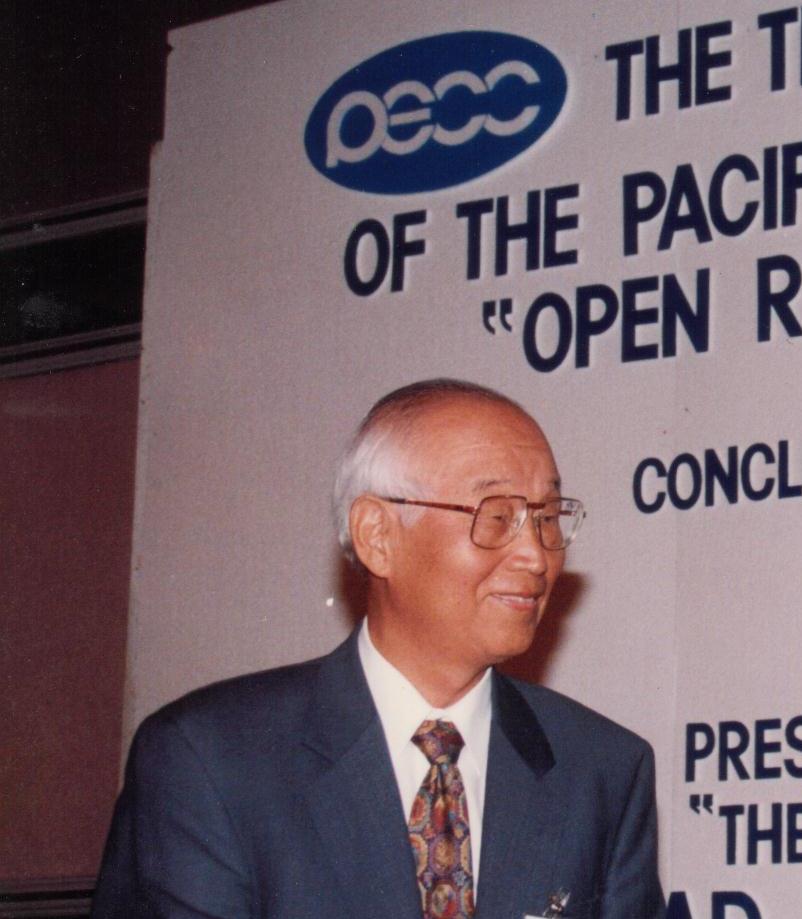 Dr. Nam Duck-woo, a founding member of PECC and first chair of KOPEC (Korea committee for Pacific Economic Cooperation) passed away on May 18th, 2013 in Seoul at the age of 89. Dr. Nam earned a doctorate in economics at Oklahoma State University and was teaching at Sogang University when in 1969 he was recruited by then President Park Chung-hee to serve as the finance minister. He remained in the position till 1974 and from 1974 to 1978, he served as the deputy prime minister in charge of economic policies at the height of Korea’s industrial development. Under the next president, Chun Doo-hwan, he served as the prime minister from 1980 to 1982. Dr. Nam held the position of KOPEC chair from 1982 to 1993. More... Dr. Nam Duck-woo, a founding member of PECC and first chair of KOPEC (Korea committee for Pacific Economic Cooperation) passed away on May 18th, 2013 in Seoul at the age of 89. Dr. Nam earned a doctorate in economics at Oklahoma State University and was teaching at Sogang University when in 1969 he was recruited by then President Park Chung-hee to serve as the finance minister. He remained in the position till 1974 and from 1974 to 1978, he served as the deputy prime minister in charge of economic policies at the height of Korea’s industrial development. Under the next president, Chun Doo-hwan, he served as the prime minister from 1980 to 1982. Dr. Nam held the position of KOPEC chair from 1982 to 1993. More...
CNCPEC: 20th Tianjin Fair and 9th PECC Expo | Tianjin, China | May 10-14, 2013
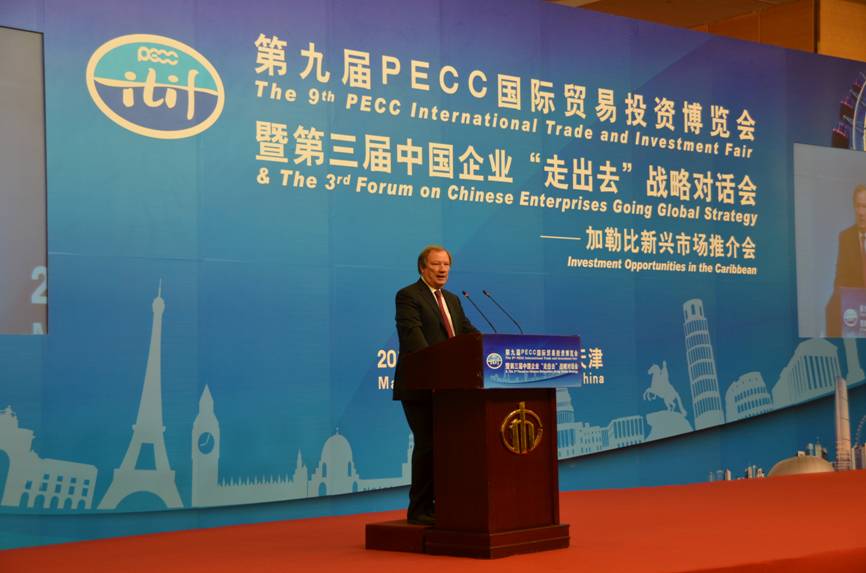 The 20th China Tianjin Investment & Trade Fair (Tianjin Fair) and the 9th PECC International Trade and Investment Expo was held at the Meijiang Convention and Exhibition Center, Tianjin, China. Under the theme of 'Expanding Trade and Economic Cooperation to Realize Win-win Development,' the Fair featured investment talks, trade promotion activities, and exchange of talents. The Fair consisted of 4,600 booths in three exhibition halls attracting 70 delegations from 20 countries and regions, and 26 provinces of China. Around 9,000 enterprises participated in the Fair with 55,000 exhibitors and visitors. This year's event resulted in total business contract value of 151 billion yuan (US$24.6 bn) being signed, of which 32.3 billion yuan (US$ 5.2 bn) came from foreign investment projects. More... The 20th China Tianjin Investment & Trade Fair (Tianjin Fair) and the 9th PECC International Trade and Investment Expo was held at the Meijiang Convention and Exhibition Center, Tianjin, China. Under the theme of 'Expanding Trade and Economic Cooperation to Realize Win-win Development,' the Fair featured investment talks, trade promotion activities, and exchange of talents. The Fair consisted of 4,600 booths in three exhibition halls attracting 70 delegations from 20 countries and regions, and 26 provinces of China. Around 9,000 enterprises participated in the Fair with 55,000 exhibitors and visitors. This year's event resulted in total business contract value of 151 billion yuan (US$24.6 bn) being signed, of which 32.3 billion yuan (US$ 5.2 bn) came from foreign investment projects. More...
PUBLICATIONS
PEO Structure: Monetary Policy Regimes in the Pacific Region (2013)
45 pages
 This Report is the 14th in a series of studies carried out by the Pacific Economic Outlook (PEO) Structure group as an international project of PECC. Following the previous topic of 'macrofinancial linkages and financial deepening,' this year, the PEO Structure group focused on monetary policy regimes, and how they affect macroeconomic performance in advanced and emerging economies in the Pacific region. In the context of ongoing global economic volatilities, macroeconomic policy trilemma - i.e. exchange rate stability, free capital mobility, and monetary autonomy - has been re-examined with the coordination of the study undertaken by Dr. Akira Kohsaka, Professor at the School of International Studies at Kwansei Gakuin University, Hyogo, Japan. More... This Report is the 14th in a series of studies carried out by the Pacific Economic Outlook (PEO) Structure group as an international project of PECC. Following the previous topic of 'macrofinancial linkages and financial deepening,' this year, the PEO Structure group focused on monetary policy regimes, and how they affect macroeconomic performance in advanced and emerging economies in the Pacific region. In the context of ongoing global economic volatilities, macroeconomic policy trilemma - i.e. exchange rate stability, free capital mobility, and monetary autonomy - has been re-examined with the coordination of the study undertaken by Dr. Akira Kohsaka, Professor at the School of International Studies at Kwansei Gakuin University, Hyogo, Japan. More...
Asia-Pacific Economic Integration and Connectivity: Pathways for Resilient and Inclusive Growth (2013)
59 pages
Edited by: Tan Khee Giap, Eduardo Pedrosa, and Grace Aw
Report of SINCPEC-INCPEC Conference, Singapore, February 2013
 The Indonesian National Committee for Pacific Economic Cooperation (INCPEC) and the Singapore National Committee for Pacific Economic Cooperation (SINCPEC) co-organized a conference of thought-leaders from the Asia-Pacific to consider challenges facing regional cooperation in the current economic climate and propose solutions to them. The Conference was funded by SINCPEC and supported by INCPEC and the broader PECC community. The discussions benefitted from a strong contingent of top level decision-makers from the Indonesian government responsible for leading its chairing of APEC this year, Mr. Hatta Rajasa, Coordinating Minister for Economic Affairs, Dr. Mari Pangestu, Minister of Tourism and Creative Economy; Mr. Mahendra Siregar, Vice Minister of Finance; Mr. Chatib Basri, Chairman of the Investment Coordinating Board; and Mr. Arto Suryodipuro, Deputy APEC SOM Chair. In addition to the representatives from this year’s APEC chair economy, many officials from other APEC economies shared their views at the conference. More... The Indonesian National Committee for Pacific Economic Cooperation (INCPEC) and the Singapore National Committee for Pacific Economic Cooperation (SINCPEC) co-organized a conference of thought-leaders from the Asia-Pacific to consider challenges facing regional cooperation in the current economic climate and propose solutions to them. The Conference was funded by SINCPEC and supported by INCPEC and the broader PECC community. The discussions benefitted from a strong contingent of top level decision-makers from the Indonesian government responsible for leading its chairing of APEC this year, Mr. Hatta Rajasa, Coordinating Minister for Economic Affairs, Dr. Mari Pangestu, Minister of Tourism and Creative Economy; Mr. Mahendra Siregar, Vice Minister of Finance; Mr. Chatib Basri, Chairman of the Investment Coordinating Board; and Mr. Arto Suryodipuro, Deputy APEC SOM Chair. In addition to the representatives from this year’s APEC chair economy, many officials from other APEC economies shared their views at the conference. More...
Sustainable Management of Marine Resources (2013)
202 pages
ISBN 9-789810-763343
 The publication is an outcome of a PECC international project that was conducted in a series of three seminars during 2011-2012. These seminars highlighted the challenges and threats from climate change, importance of regional cooperation in marine surveillance and environmental regulations, as well as potential economic benefits that could be attained from better management of the oceans in the fields of food, security, medicine, and energy production. New Caledonia constituency of FPTPEC hosted the first seminar, followed by second hosted in Hawaii by the East West Center and the Natural Energy Laboratory of Hawaii Authority (NELHA); the concluding seminar took place in Auckland, organized by NZPECC and the University of Auckland. More... The publication is an outcome of a PECC international project that was conducted in a series of three seminars during 2011-2012. These seminars highlighted the challenges and threats from climate change, importance of regional cooperation in marine surveillance and environmental regulations, as well as potential economic benefits that could be attained from better management of the oceans in the fields of food, security, medicine, and energy production. New Caledonia constituency of FPTPEC hosted the first seminar, followed by second hosted in Hawaii by the East West Center and the Natural Energy Laboratory of Hawaii Authority (NELHA); the concluding seminar took place in Auckland, organized by NZPECC and the University of Auckland. More... |
PECC in the News
APEC SOM3
PECC Update to APEC
Senior Officials Meeting 3
Medan, Indonesia
July 6-7, 2013
(NEW) PECC CORPORATE BROCHURE 2013
The new brochure is available for download. (PDF, 1.6MB)
YOUTH COMMENTS FROM THE 21ST PECC GENERAL MEETING
"The PECC graduate students' program is a great professional development tool for future leaders of the Asia-Pacific region. [...] This program has helped to form a larger network of contacts for these young people, who continue to work together in order to present initiatives that actually generate social and economic impact throughout the region." (Marcelo Alonso Valverde Arévalo, Researcher, Center for Integration and Trade Studies, Peruvian University of Applied Sciences (UPC), Peru)
"Apart from the conference, the networking experience with students from other member economies is also inspiring. [...] As part of 2013 PECC, we are not only student delegates, but also next generation diplomats. In the coming 6 months, we will keep working on our project and present policy suggestions to PECC." (He Pei, Shanghai International Studies University, China)
"One of the things I consider valuable is the idea to divide all the young delegates in working groups so we could focus on our specific topic and develop a policy brief. Also the program gave us the opportunity of knowing what a policy brief is and how it could be useful in specific fields of action by the governments. When we started to work in our groups I could realize how difficult is to reach an agreement between all; all of us have a different background and come from different countries so we tried to focus on the common problems among the countries and propose an innovative solution." (Gustavo J. García Buleje, Trade Manager, Cargo World, Peru)

DISCUSSION FORUM
Geopolitical Urgency and Economic Liberalization in the Asia-Pacific
Corey Wallace
Teaching Fellow, Political Studies, University of Auckland/ New Zealand youth delegate to PECC GM XIX, 2010
Keen observers of Asia-Pacific regional integration will not have missed the development of an interesting dynamic in recent years - that of geopolitical competition driving the economic liberalization agenda. The politicization of economic relations and interconnections is of course nothing new. The opening of the American market after World War II to Germany and Japan was a critical part of early US Cold War strategy, as was encouraging Japan to limit its trading relationship with the People’s Republic of China and other Communist governments in Asia. More...
Abe TPP Strategy: Overcoming Domestic Division through Reform?
Theresa Robles
Associate Research Fellow with the Centre for Multilateralism Studies, S. Rajaratnam School of International Studies (RSIS), Nanyang Technological University, Singapore
Synopsis
Abe’s recent announcement of Japan’s intention to join the TPP is seen not only as an important vehicle to expand trade and investment opportunities but also as a way to reposition the country as a major regional power.
Commentary
The announcement by Prime Minister Shinzo Abe on 15 March 2013 of Japan’s intention to join the Trans-Pacific Partnership (TPP) has stepped up the momentum of negotiations for the trans-oceanic trade and investment arrangement. The prospective entry of the world’s third largest economy will significantly broaden the TPP’s reach and impact on the Asia-Pacific trading system. More...
Global Risk from Trade Wars: Time to Return to WTO
Barry Desker
Dean of the S. Rajaratnam School of International Studies (RSIS), Nanyang Technological University, Singapore
Synopsis
The WTO Doha Round of negotiations is deadlocked and adrift amid increasing global protectionism. The profusion of bilateral and plurilateral free trade agreements is adding to the confusion. A global solution is necessary for global problems.
Commentary
Singapore recently played host to the 16th round of the Trans-Pacific Partnership (TPP) membership talks. Soon after, Japan announced plans to join the TPP. The next round of talks in May will be held in Peru and optimistic negotiators say that member countries are on track to reach an accord by the end of the year. More...
Call for Papers: APEC Study Center
The APEC Study Center invites scholars to send research papers in working draft form for inclusion in its Discussion Paper Series.
They accept papers on issues of political and economic policy, especially trade policy, in countries throughout the Asia-Pacific region, including China, Chinese Taipei, Korea, Vietnam, etc. The Series can be helpful for generating comments for your paper prior to submission to an academic journal or elsewhere.
It currently contains 70 papers, which can be found under “Discussion Papers” on the website.
Please send any papers as Word documents (preferred) or PDFs to:
Andy Wanning
w2040@columbia.edu
|












